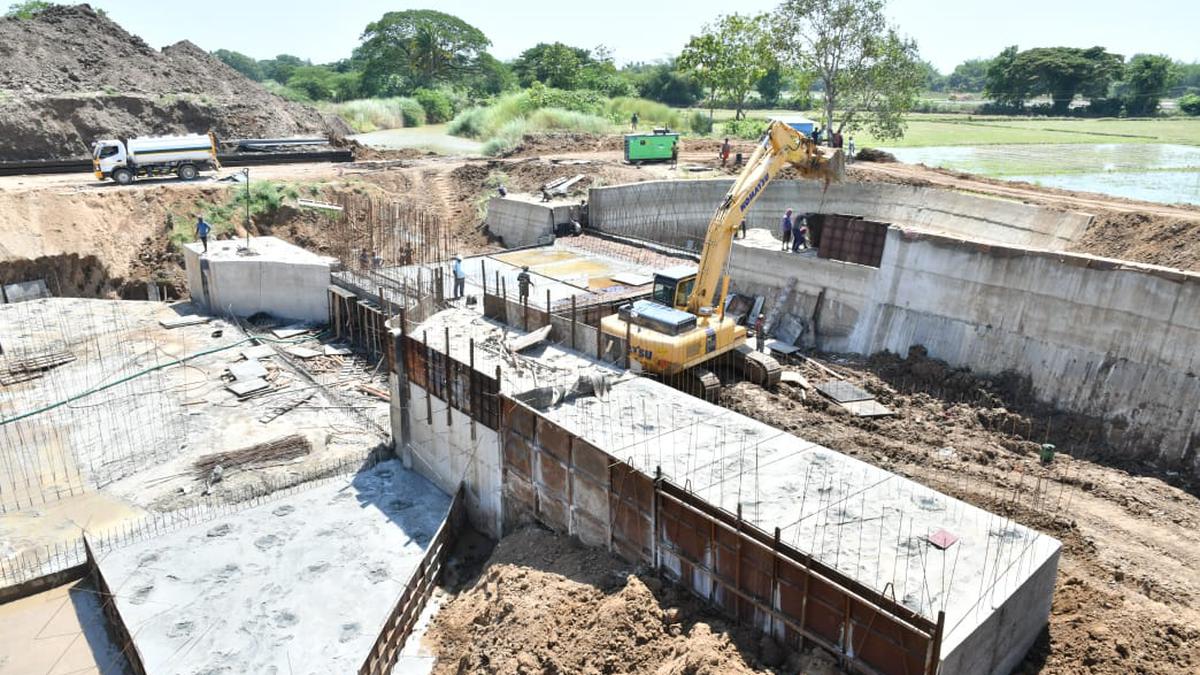
Barrage across Kollidam river in Mayiladuthurai district nearing completion
The Hindu
Construction of barrage in Mayiladuthurai district nears completion; 95% of project done. Water Resources Dept. exploring cost-effective water conservation projects. Barrage to recharge groundwater aquifers, divert water to Veeranam Lake.
The construction of a barrage across Kollidam river at Thiruchitrambalam village in Mayiladuthurai district has reached final stages and is likely to be completed within two months.
The Water Resources Department had mooted a proposal to construct a regulator across the Kollidam river by connecting Kumaramangalam and Adhaanoor villages near Thiruchitrambalam in Mayiladuthurai district. Accordingly, the State government sanctioned ₹ 463.24 crore for the project and the construction work commenced in 2019.
Recently, Collector A.P. Mahabharathi inspected the construction of the water regulator at Thiruchitrambalam to take stock of the work progress. He checked the quality of materials used in construction and directed the officials from the Water Resources Department to expedite the project.
A senior official from the Water Resources Department said the 1,064-metre-long barrage connecting Kumaramangalam and Adhaanoor has been constructed with 84 shutters that can store 0.33 tmc ft of water. Nearly 95% of the project has been completed and the remaining minor works may take around two months to complete.
The objective of constructing a barrage across the Kollidam river in Mayiladuthurai district is to recharge groundwater aquifers by stabilising the water flow and not for storage purposes, the official said.
Pumping stations could be installed with the minimal storage available to supply drinking water to the surrounding areas. Water could be diverted from the barrage to Veeranam Lake near Kattumannarkovil in Cuddalore district to improve water storage in the reservoir, the official added.
The Water Resources Department is also exploring possibilities of implementing cost-effective water conservation projects using modern techniques. Official sources said though the construction of structures like barrages across rivers is useful for recharging groundwater aquifers, they are expensive and require voluminous resources.

“Writing, in general, is a very solitary process,” says Yauvanika Chopra, Associate Director at The New India Foundation (NIF), which, earlier this year, announced the 12th edition of its NIF Book Fellowships for research and scholarship about Indian history after Independence. While authors, in general, are built for it, it can still get very lonely, says Chopra, pointing out that the fellowship’s community support is as valuable as the monetary benefits it offers. “There is a solid community of NIF fellows, trustees, language experts, jury members, all of whom are incredibly competent,” she says. “They really help make authors feel supported from manuscript to publication, so you never feel like you’re struggling through isolation.”

Several principals of government and private schools in Delhi on Tuesday said the Directorate of Education (DoE) circular from a day earlier, directing schools to conduct classes in ‘hybrid’ mode, had caused confusion regarding day-to-day operations as they did not know how many students would return to school from Wednesday and how would teachers instruct in two modes — online and in person — at once. The DoE circular on Monday had also stated that the option to “exercise online mode of education, wherever available, shall vest with the students and their guardians”. Several schoolteachers also expressed confusion regarding the DoE order. A government schoolteacher said he was unsure of how to cope with the resumption of physical classes, given that the order directing government offices to ensure that 50% of the employees work from home is still in place. On Monday, the Commission for Air Quality Management in the National Capital Region and Adjoining Areas (CAQM) had, on the orders of the Supreme Court, directed schools in Delhi-NCR to shift classes to the hybrid mode, following which the DoE had issued the circular. The court had urged the Centre’s pollution watchdog to consider restarting physical classes due to many students missing out on the mid-day meals and lacking the necessary means to attend classes online. The CAQM had, on November 20, asked schools in Delhi-NCR to shift to the online mode of teaching.









